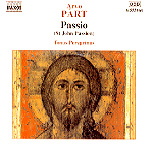The main question here is, how does this newcomer compare to the reference recording of Arvo Pärt’s unique and poignant Passion setting, a 1988 ECM production performed by the Hilliard Ensemble and conducted by Paul Hillier. Clearly, on the all-important sonic front the ECM disc has more presence, more distinct detail, and better balances, and in terms of the performances, the Hilliards and friends are far more expressive in their shaping of lines and sonorities–both voices and instruments. There’s an almost tactile sensation to the sound, a kind of electric buzz in the many instances where voices collide in brief explosions of dissonance, then bounce off into more congenial thirds, fourths, and sixths. Although the various soloists are fine on both recordings, one listen to ECM’s Jesus, Michael George, (try the “Dixi vobis” section), shows how much more commanding are his rich timbre and artful expressive manner than shown by the still very good Robert Macdonald for Naxos. Similarly, David James’ countertenor for ECM lends a more appealing vibrant quality to the texture than does the thinner-voiced Alexander L’Estrange for Naxos.
The differences between the two recordings are perhaps most telling in the vocal ensemble sections, which are more distant and softer-edged in the Naxos recording, and often are covered too much by instruments. Naxos gives us a beautiful sound as far as it goes, and if it weren’t for the ECM recording, this would make a perfectly fine impression. But where this one is pretty, the Hilliards and ECM deliver a performance that’s consummately dramatic, profound, and unforgettable in its impact. In the opening minutes of Naxos’ track 2, for example, the interaction of the two solo voices with instruments just isn’t as firmly integrated nor does it convey the energy or sense of occasion as we hear on the reference disc.
In fact, “sense of occasion” is what defines the major difference between these performances/recordings. To a large degree, it’s the mellower Naxos sound that leaves us feeling less impressed than we are after hearing ECM’s more “alive” production. In a piece that overall has very little “action”, but in a musical/structural sense is concerned with the elemental function of sound and silence, of permutations of timbre and texture, and of the natural concordant/discordant flow of human dialogue seeking to express something of profound spiritual import, we need to feel touched, somehow affected by the experience. For me, the Naxos recording, which smooths the edges off and delivers a merely beautiful sound misses that important affective quality. Yes, you won’t really go wrong with this excellently performed Passio (even more attractive at its budget price), but Hillier and ECM left little else to be said in a work for which sincerity of expression and sonic realism are far more important than any attempt at “interpretation”. [10/8/2003]
































